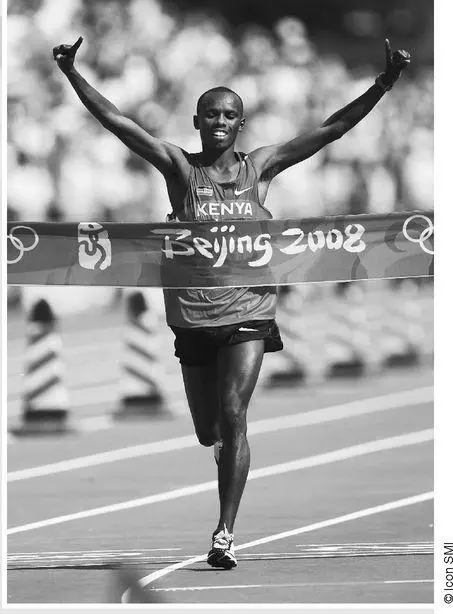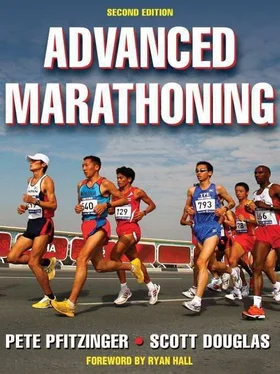Pfitzinger Pete - Advanced Marathoning
Здесь есть возможность читать онлайн «Pfitzinger Pete - Advanced Marathoning» весь текст электронной книги совершенно бесплатно (целиком полную версию без сокращений). В некоторых случаях можно слушать аудио, скачать через торрент в формате fb2 и присутствует краткое содержание. Год выпуска: 2008, Издательство: Human Kinetics - A, Жанр: Спорт, на английском языке. Описание произведения, (предисловие) а так же отзывы посетителей доступны на портале библиотеки ЛибКат.
- Название:Advanced Marathoning
- Автор:
- Издательство:Human Kinetics - A
- Жанр:
- Год:2008
- ISBN:нет данных
- Рейтинг книги:5 / 5. Голосов: 1
-
Избранное:Добавить в избранное
- Отзывы:
-
Ваша оценка:
- 100
- 1
- 2
- 3
- 4
- 5
Advanced Marathoning: краткое содержание, описание и аннотация
Предлагаем к чтению аннотацию, описание, краткое содержание или предисловие (зависит от того, что написал сам автор книги «Advanced Marathoning»). Если вы не нашли необходимую информацию о книге — напишите в комментариях, мы постараемся отыскать её.
Advanced Marathoning — читать онлайн бесплатно полную книгу (весь текст) целиком
Ниже представлен текст книги, разбитый по страницам. Система сохранения места последней прочитанной страницы, позволяет с удобством читать онлайн бесплатно книгу «Advanced Marathoning», без необходимости каждый раз заново искать на чём Вы остановились. Поставьте закладку, и сможете в любой момент перейти на страницу, на которой закончили чтение.
Интервал:
Закладка:
New substances and combinations of substances are being introduced to the market each week, almost all of which will be of no benefit to your athletic performance.
Of the pharmacological and physiological ergogenic aids that have been shown to have a positive effect on athletic performance, almost all have been banned by the International Olympic Committee and many other sporting bodies. Within the realm of legal pharmacological or physiological ergogenic aids, the only ones that may provide benefits for an endurance athlete are moderate amounts of caffeine or glycerol.
The effects of caffeine were discussed earlier in this chapter. That leaves glycerol, a product that our bodies produce naturally. Glycerol supplementation increases total body water stores. This may be an advantage for a warm-weather marathon because if you start the race with more stored fluid, then it should follow that the effects of dehydration will be postponed until later in the race. Although several sports drinks on the market contain glycerol, it’s still open to debate whether glycerol leads to enhanced performance during warm-weather competitions. (Glycerol supplementation isn’t advisable for shorter races in cool conditions because the weight of the extra fluid you carry would be detrimental to performance.)
Marathon Race-Day Nutrition and Hydration
So you’ve followed the advice in this chapter and eaten properly and stayed well hydrated throughout your months of preparation. Guess what – your work isn’t done yet. Your strategies for taking calories and fluid on race day can have a strong influence on your marathon performance.
Sammy Wanjiru
Fastest Marathon: 2:05:24
Marathon Highlights:
First place, 2008 Olympics in
Olympic record time (2:06:32);
Second-fastest debut
marathon in history (2:06:39).
Sammy Wanjiru is the latest – and most successful – marathoner to merge two powerful elements: Kenyan genetics and a Japanese marathon mind-set. The payoff, at age 21 in just his third marathon, was Kenya’s first Olympic gold medal in the marathon.
When he was 15, Wanjiru won a cross country race in Kenya that served as a selection contest for runners who would attend high school in Japan. Once abroad, Wanjiru, who had grown up running half an hour or so per day, was immersed in Japan’s running culture. That meant he was soon running twice a day in a group setting, at high volume with an emphasis on long-term aerobic development.

Upon graduating, Wanjiru was contracted to run for one of Japan’s corporate teams. Although he was soon world-class, with a world junior record for 10,000 meters (26:41.75) and a world record in the half marathon (58:35), his obligations with the corporate team kept him from the siren of overracing that has undone so much young Kenyan talent. His main responsibility was representing his team in four “ekiden,” or marathon-length relay races, a year.
In the ekidens, in which the fields are usually strung out after the first leg, Wanjiru mastered running hard by feel and by himself. Japanese-style training, which has as its cornerstones very long long runs, lengthy tempo runs (20 kilometers or more), and long, threshold-based sessions, such as four 5-kilometer repeats, encourages intuition and independence.
It was no surprise, then, when Wanjiru won his first marathon, Fukuoka, in December 2007, and followed that up with a second-place finish at the 2008 London Marathon. After all, consciously or not, he had been training for the marathon for the last six years. In addition, despite the high mileage, he was fresh – as he said before London, “too many races, not good.”
Wanjiru’s victory in the Beijing Olympics was a masterpiece of self-knowledge. Despite the warm, humid conditions, Wanjiru set a fast pace from the start, because he feared that a slow, tactical race would let lesser runners be near him at the finish and outkick him. What to most of the world looked to be a suicidal 2:06 pace was actually a supremely well-judged effort, as Wanjiru ran halves of 1:02:34 and 1:04:02, despite rising temperatures in the latter part of the race. His performance shows what solid training, an excellent sense of perceived effort, and self-confidence can make possible.
Let’s assume you’ve done a good job of glycogen loading during the previous several days and you’re well hydrated. Before the race, you want to take in between 200 and 500 calories of mostly carbohydrate to top off your glycogen stores. It’s best to ingest these calories 3 to 4 hours before the race. This shouldn’t be a big deal for races with late starts, such as New York City, which begins a little after 10 a.m., or Boston, with its 10:00 and 10:30 a.m. wave starts. But for a race such as Chicago, which starts at 8:00 a.m., or Honolulu, which starts at 5:00 a.m. (!), you may have to get up a bit on the early side, eat something, and then try to doze a while longer. (Good luck with that on race morning!) You should also take in about a pint (half a liter) of fluid to replace fluids lost overnight and ensure that you’re fully hydrated.
Even if you carefully carbohydrate load for several days leading up to the marathon, you don’t have much of a buffer against glycogen depletion. The solution is to take in additional calories during the race.
How much you need to drink during the marathon depends on your body size, the heat and humidity, and your sweat rate. The maximum amount you should drink during running is the amount that can empty from your stomach or the amount that you have lost as sweat, whichever is less. Drinking more than you have lost brings the risk of hyponatremia, which is discussed later in the chapter.
Research has shown that most runners’ stomachs can empty only about 6 to 7 ounces (180 to 210 ml) of fluid every 15 minutes during running, representing about 24 to 28 ounces (720 to 840 ml) per hour. If you drink more than that, the extra fluid will just slosh around in your stomach and not provide any additional benefit. You may be able to handle more or less than the average, however, so experiment with how much liquid your stomach will tolerate.
During training, it’s relatively easy to stop and drink as much as you want whenever you feel like it. All that’s required is a bit of planning and perhaps a few containers strategically placed the night before your long run. During the marathon, however, it’s very difficult to drink 6 to 7 ounces (180 to 210 ml) of fluid at an aid station without stopping. In fact, a study by Tim Noakes, MD, and colleagues (2007) found that most runners drink less than 16 ounces (480 ml) per hour when racing. Another study found that runners lose, on average, 3.2 percent of body weight during a marathon. As we saw earlier in this chapter, a loss of more than 3 percent of body weight can lead to a significant loss in performance. Many serious marathoners, therefore, run the marathon slower than their potential because of the effects of progressive dehydration during the race.
Drinking 28 ounces (840 ml) per hour of a 4 percent solution will supply 32 grams of carbohydrate, whereas an 8 percent solution will supply 64 grams of carbohydrate. Each gram of carbohydrate contains 4.1 calories, so you’ll be taking in 130 to 260 calories per hour. If you run the marathon in 2:45, therefore, you’ll take in about 350 to 700 calories during the race. During the marathon, a typical 140-pound (63 kg) male burns about 100 calories per mile. Of those 100 calories, about 80 are supplied by carbohydrate and the remaining 20 by fat. The carbohydrate you consume during the race, therefore, supplies enough carbohydrate fuel to last an extra 4 to 9 miles (6 to 14 km)! Even if you take in only half this amount, you’ll substantially increase your chances of reaching the finish without running out of glycogen.
Читать дальшеИнтервал:
Закладка:
Похожие книги на «Advanced Marathoning»
Представляем Вашему вниманию похожие книги на «Advanced Marathoning» списком для выбора. Мы отобрали схожую по названию и смыслу литературу в надежде предоставить читателям больше вариантов отыскать новые, интересные, ещё непрочитанные произведения.
Обсуждение, отзывы о книге «Advanced Marathoning» и просто собственные мнения читателей. Оставьте ваши комментарии, напишите, что Вы думаете о произведении, его смысле или главных героях. Укажите что конкретно понравилось, а что нет, и почему Вы так считаете.










